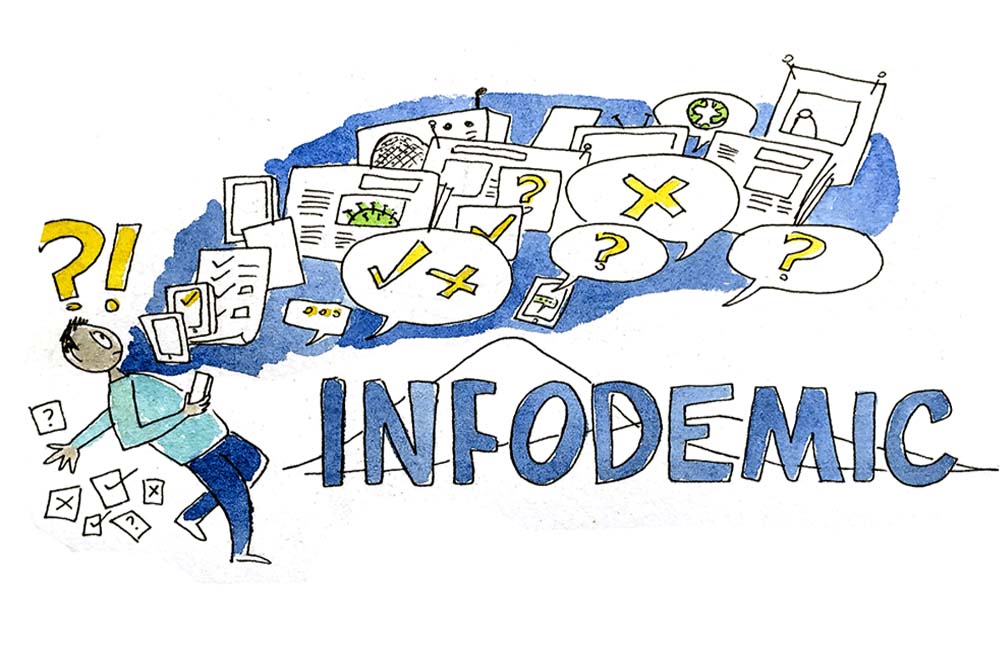Disclaimer: The Eqbal Ahmad Centre for Public Education (EACPE) encourages critical and independent thinking and believes in a free expression of one’s opinion. However, the views expressed in contributed articles are solely those of their respective authors and do not necessarily reflect the position or policy of the EACPE.
“Is the virus fake?” one student asked with a slight grin and gleamy eyes. “Is it a global plot against the Muslim world by the Jewish lobby?” others interrupted. “Do you see any corpses in the city of New York or is its American propaganda?” another uttered. Such were the questions, my students wanted me to answer, as I was having a Zoom call back home in Pakistan. They all seemed to be immensely overwhelmed by what they had heard or read on social media, not caring to ponder if the sensational news was logical in the global set up. Plagued by misinformation rampant on social media, they seemed clueless if the pandemic existed. While most of them were giving me references to social media remedies for Covid-19, very few understood the gravity of the current situation; manifesting that the government has to deliver a message with clarity and concern to its citizens.
Every day in the USA, I wake up with at least 9 messages mostly from my students and relatives trying to bombard me with the false information they have been exposed to through social media, friends, or friends of friends. What is common in all those messages is that how the misinformation can make the public opinion about any subject – the pandemic in this case.
In Pakistan, the avalanche of misinformation is getting larger and larger as the situation takes a turn towards the worse.
In the USA, people were reportedly injecting themselves with disinfectants to keep them safe from the virus. Expectedly, many lost their lives; devastation that can be caused by misinformation. Globally, the onslaught of misinformation is magnanimous. Governments and networking sites are facing more criticism for being a catalyst for the spread of misinformation. Cautiously they act now. WhatsApp recently limited the number of forwarding messages to reduce the spread of misinformation; Twitter is adding ‘fact check’ flags on tweets to debunk false facts.
In Pakistan, the avalanche of misinformation is getting larger and larger as the situation takes a turn towards the worse. An exponential rise in the number of infections, uncertainty, and the tendency to believe without any evidence prove to be the fertile breeding ground for false news. Ranging from the origin of the virus to the fortified immune system of the Pakistanis, disinformation has left no side untouched.
One of the fundamental factors promoting false information, in Pakistan, is the trust deficit between the public and the government; blamed for sweeping truth under the carpet. People, therefore, are more susceptible to news from social media; adding to their baggage of misinformation.
Last week, I had a call from one of my colleagues who was shaken by the “news” that the hospitals were receiving remuneration from the World Health Organization for every death of Covid-19 patients. Encouraged by the monetary benefits, according to her, the hospitals were injecting the virus into the bodies of the patients in a hurry to proclaim them as dead; enabling them to fill their pockets. A similar anecdote can be heard from a cleric in a video going viral on social media, prohibiting his followers from going to the hospitals in case of infection. Otherwise, their dead bodies will be traded off for dollars.
Misinformation does serve to people. It is cynically exploited by businesses for ad-supported “fake news,” by scammers raising money online, and by individuals to increase personal stature. An antidote is essential; especially when the polarity is conspicuous, society is divided into sects, class segregation is broad and resources of the country are depleting in the fight against the pandemic.
We can learn from other countries around the world; countering the flux of misinformation.
We can learn from other countries around the world; countering the flux of misinformation. Australia has launched media literacy with a government task force; Bahrain has more stringent measures of arrest for media regulation; Brazilian government uses a fact-checking mechanism; China, on the other hand,utilizes online reporting portal against the misinformation while India is content with its state laws and internet shut down to prevent the misinformation.
In early October 2018, the Pakistani government started going after misinformation. Ministry of Information and Broadcasting launched a twitter account in an attempt to debunk “fake and negative propaganda” online and resolved to punish the culprits.
It is hard to be on the toes all the time; however, students and the general public must develop tactical reading skills to decern information from misinformation. The checklist will not only be beneficial for them but will also prevent them to disperse false facts.
Firstly, emotionally charged stories, demanding monetary contribution, or are too ideal needs to be double-checked. Secondly, while getting information try to check its source. Thirdly, understanding the nature of the content also helps in knowing if the content is a satire or some important pieces of information is left out?
The government’s seriousness is essential to debunk false information. The government can best deal with misinformation with timely dispersal of factual information and educating the public. What people listen to and watch is going to have a huge impact on the precautions they take and their response if they are infected in the pandemic.
About the Author
 Muhammad Ali Falak is a Fulbright PhD candidate at Texas A&M University and graduated from The University of Tokyo. He is also serving as a Senator in the Graduate Professional Student Government at Texas A&M University.
Muhammad Ali Falak is a Fulbright PhD candidate at Texas A&M University and graduated from The University of Tokyo. He is also serving as a Senator in the Graduate Professional Student Government at Texas A&M University.








